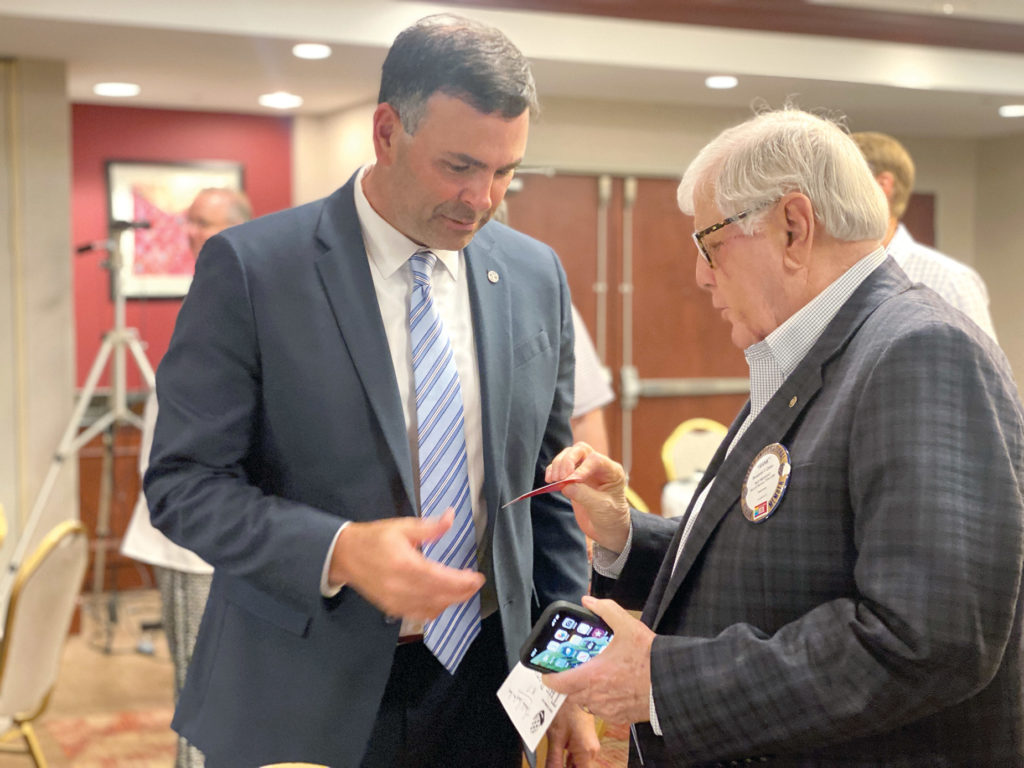Starkville Rotarians packed into a conference room at the Hilton Garden Inn on Monday as Mississippi’s Secretary of State Michael Watson spoke about the responsibilities he holds in office.
In Mississippi the Secretary of State serves as the chief elections officer for Mississippi, and Watson said when he was elected into office in 2019, he set out to speak to all of the circuit court clerks in all 82 counties in the state.
Circuit clerks and election commissioners within each county run the elections the Secretary of State’s Office oversees. Watson wanted to learn what works best for the counties and how best to help out those running the local elections.
“What’s important to know is that (for) elections in Mississippi, we’re a bottom-up state,” Watson said. “That means the hard work is all done at the local level. Your circuit clerks and your elections commissioners are the ones you really need to focus on. They do the heavy lifting. … I announced early on in my very first year that we were going to go to all 82 counties and sit down with every clerk and all of the election commissioners because they’re the experts. I know about elections, but they run this on a day-to-day basis, so I wanted to know the experts’ opinion.”
When it comes to elections, the office oversees many roles such as training elections officials, collecting campaign finance and lobbying reports, and collecting election returns among other duties.
Prior to 2017, all campaign finance civil penalties were assessed by the Secretary of State’s Election Division. However, since then, they have been assessed by the Ethics Commission, due to former Gov. Phil Bryant signing 2017 Senate Bill 2689 into law.
During that time period, Watson was a senator representing the 51st district, which consists of Pascagoula. He voted in favor of the change from the Secretary of State’s Office to the Ethics Commission, but he now would like that to shift back.
“Up until 2017, it had been with the Secretary of State’s Office, and I was in the (Mississippi) Senate at the time,” Watson told The Dispatch.
“I remember there were discussions about how it worked, and I thought if they think there’s a way to make something work better, I don’t see why we can’t give it a chance. We started to see some of the disjointedness in the first couple of years. In talking with the Ethics Commission, we saw this legislation coming, and we thought because of the disjointed nature and there are all these fines out there and no one is paying them, who’s dropping the ball? We could take out some of the disjointed nature of it and put it back where it was.”
On April 21, Gov. Tate Reeves vetoed Senate Bill 2306 that would serve as moving the assessment of campaign finance civil penalties back to the Secretary of State. The bill passed in the Senate (51) and House (117) with an overwhelming majority voting in favor. Watson expressed to The Dispatch he would like to see the veto challenged.
In a statement after the veto, Watson said he would like to see that responsibility back under his office.
“The bill passed both chambers with an overwhelming bipartisan majority but, unfortunately, was vetoed by the Governor,” Watson said.
“Had he consulted with the Ethics Commission or my office before vetoing this legislation, he would have understood the need for revisions. I believe we should return the penalty assessment power back to an elected official accountable to the public on Election Day, not an administrative body.”
Tackle the Tape
Watson told about the “Tackle the Tape” program his office currently has going with the intention to help small businesses. In Mississippi, there are 118,000 regulations that are set-up for small businesses, and the purpose of the site is for business owners to report ordinances that are harmful to businesses.
The program began in 2020, and it is done through a link on the Secretary of State’s website under the program’s name. The office handles business services, and this includes looking at business regulations within the state.
“What we do is if you have any questions, if you see some kind of regulation that is bad for business, any kind of ordinance at the city level, any kind of statute that is bad for business, we want you to report that to us,” Watson said. “In 2016-17, we passed in the legislature, back when I was in the state Senate, what was called the OLRC — Occupational Licensing Review Commission. They oversee 29 boards of commissions for occupational licensing issues. Any new rule or regulation that comes to any of those occupations would come through the ORLC, and if it was overly broad and not for public health benefit or bad stuff, we could strike it and send it back to the drawing board. (It’s a) great idea. It helps with new regulations, but if it’s just 29 boards of commissions, how do we reach everything else?”
Legislation passed for the office to look back at old regulations, and they launched “Tackle the Tape” that has the purpose to cut regulations that are anticompetitive and do not further the safety and well-being of Mississippians.
“Cutting regulations actually has an impact on our state,” Watson said.
You can help your community
Quality, in-depth journalism is essential to a healthy community. The Dispatch brings you the most complete reporting and insightful commentary in the Golden Triangle, but we need your help to continue our efforts. In the past week, our reporters have posted 45 articles to cdispatch.com. Please consider subscribing to our website for only $2.30 per week to help support local journalism and our community.







